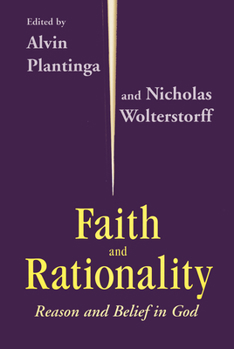Faith and Rationality: Theology
Select Format
Select Condition 
Book Overview
Arguments about the "evidences of Christianity" have consumed the talents of believers and agnostics. These arguments have tried to give--or to deny--Christian belief a "foundation." Belief is rational, the argument goes, only if it is logically derived from axiomatic truths or is otherwise supported by "enough evidence." Arguments for belief generally fail to sway the unconvinced. But is this because the evidence is flimsy and the arguments...
Format:Paperback
Language:English
ISBN:0268009651
ISBN13:9780268009656
Release Date:June 1984
Publisher:University of Notre Dame Press
Length:328 Pages
Weight:1.15 lbs.
Dimensions:0.8" x 6.0" x 9.0"
Customer Reviews
3 ratings
A Great Introduction to "Reformed Epistemology" and it's origins
Published by Thriftbooks.com User , 16 years ago
Faith and Rationality is split into 9 different sections, including the introduction. (The introduction includes the major themes of the book and how it is primary a work of Reformed scholarship.) There are two short stories by George Mavrodes which I found highly amusing, and which were a nice break from the difficult readings. The rest of the book--the majority of it--is composed of 6 essays. The first essay is Plantinga's "Reason and Belief in God." This is one of Plantinga's earlier essays on "Reformed Epistemology" and is highly recommended. It's a great introduction to the thought he more fully develops later on (primarily in the "Warrant Series"). The first part of the essay moves through the evidentialist objection to theistic belief and its various forms. In the second part of the essay Plantinga charges Aquinas with holding the view, speaking roughly, that belief in God is irrational without evidence. In this part Plantinga also argues that Classical Foundationalism is self-referentially incoherent. Part three goes through reformed objections to Natural Theology. During the last part of his essay Plantinga argues that belief in God is properly basic. The second essay is William Alston's "Christian Experience and Christian Belief." Alston argues that certain Christian experiences (the presence of God, the moving of the HS, etc.) contribute to the rationality of Christian belief. I am not familiar with Alston's work, but after reading this essay I intend to do some follow up reading on his views (which, I assume, are expanded in Perceiving God: The Epistemology of Religious Experience). The third essay is Wolterstorff's "Can Belief in God Be Rational If It Has No Foundations?" Wolterstorff picks up where Plantinga leaves off. If Classical Foundationalism (and Natural Theology) are bankrupt, can belief in God still be rational? Wolterstorff's resounding answer is "Yes." Wolterstorff has a fascinating exposition of Locke and Reid in this essay. He eventually concludes, following Reid, that people have different "belief dispositions" which allow them to form rational beliefs, of which "reasoning" is only one disposition. George Mavrodes' "Jerusalem and Athens Revisited" comes next. Relatively short, in comparison to the other essays, I found Mavrodes' essay very useful. He asked some probing questions, and made some very sharp distinctions which aided my understanding of the previous essays greatly. The book continues with George Marsden's essay entitled "The Collapse of American Evangelical Academia." I found this essay fascinating and loosely connected to the overall themes of the book. Finally, the book concludes with a essay by D. Holwerda called "Faith, Reason, and the Resurrection." This essay is a exposition and examination of Wolfhart Pannenberg's theology. Most people who buy this book will buy it for Plantinga's and Wolterstorff's essays. Fair enough. But some of the other essays are very interesting (especially Marsden's) a
Excellent primer on reformed epistemology
Published by Thriftbooks.com User , 20 years ago
In laying the groundwork for a reformed epistemology, this book defines the idea of "rational belief" and shows how this definition is superior to the one assumed by contemporary logical positivists (i.e., many atheists and agnostics coming from the scientific perspective).Summary: It can be rational to believe something without "proof"; we all do it all the time.In measuring whether belief in God qualifies as rational, this book shows compellingly that belief in God is properly basic; i.e., it needs no general justification.I found Marsden's chapter ("The Collapse of American Evangelical Academia") also to be quite informative. Before I read this chapter, I had ideas about the current state of the Evangelical mind (I've read OS Guiness, Dorothy Sayers, etc.), but I didn't really understand how we got where we are.I highly recommend this book for anyone interested in the basics of justifying his/her Christianity either to him/herself, or to the world.
Introduction to Alvin's Epistemology
Published by Thriftbooks.com User , 22 years ago
"Faith and Rationality" is not a layperson's book (what did you expect!). This is the introduction to the whole notion of "reformed epistemology." The essays are composed by Alston, Mavrodes, Wolsterstorff, Plantinga, Marsden, and D. Holwerda. The theme of the book begins with the rejection of "classical foundationalism," which is later supplemented by an agument for God's existence (God's existence is properly basic). I was very surprised and intrigued by D. Holwerda's essay. His eerie essay critiques Wolfhart Pannenburg's theology and thought on the Resurrection of Christ. Good book before reading Alvin Plantinga's Warrant series.




